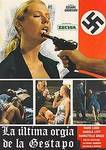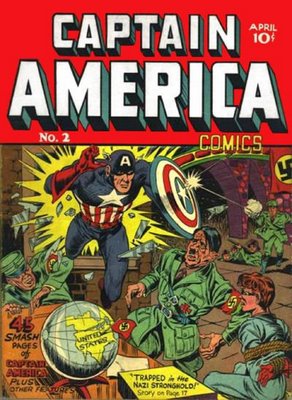
Conclusion to Gestapo Articles
By Vincent Reynouard
Translated by C.W. Porter
Conclusion

Sixty years afterwards, the official history provides a completely false picture of the Gestapo. Manipulating the Nuremberg judgement, it presents it as an assembly of criminals sowing terror starting in 1933 in Germany, then in the occupied counties starting in 1939-40.
The Gestapo, we are told, took charge of suppressing all opposition, even if only potential. To carry out this mission, it maintained a network of informers, arrested people arbitrarily, tortured them, sent to concentration camps, shot them, etc. Its victims numbered in the tends of thousands.
As usual, whenever the question of Hitler’s Germany is involved, the image created results from a skillful illumination of the scene. Only one part of the stage is lit up, while the rest of the stage is plunged into darkness, which makes it possible to conceal any disturbing facts. Concerning the creation of the Gestapo, they conceal the real condition of Germany in January 1933 : the terrible economic crisis, the bankruptcy of parliamentarian government, the paralysis of the institutions, the real danger of Bolshevism. Thus, people are condemned never to understand why, once in power, the National Socialists swept away the Weimar Republic, restricted individual liberties and put together a secret police which was to defend the new regime — which was still quite weak — against the revolutionary danger.
At the time, only energetic action could save Germany from death by economic asphyxia, and, consequently the danger of Bolshevism. Hitler did not hesitate to take such action. The immense majority of the German people understood why and followed him, too happy to find a future worthy of the name. For this reason, far from constituting an instrument of terror, the Gestapo was a perfectly ordinary political police force, with relatively modest means, such as such a police force had already existed under the Weimar Republic and such as exists in practically all countries. In 1939, moreover, only 0.05 % of the German population was interned for political reasons.
The fact that, until the war, the Gestapo acted like a perfectly ordinary police force was so obvious that, at Nuremberg, the judges declared it a « criminal association » starting in 1939 only. For sixty years, however, historians have been concealing this basic fact.
Does this limitation mean that the IMT judgement was justified? I don’t think so. Since, for the period from 1940 to 1945, the judges also based their judgements on an image created using a scene which was only partially illuminated. In particular, they neglected the fact that starting on 3 September 1939, Germany was fighting a life and death struggle, and, starting in 1942, this struggle became a desperate struggle between the three greatest world powers. At this time, the Reich was encircled everywhere, subject to a pitiless blockade and under attack on two fronts. Caught up in the whirlwind of fire, could it permit that, behind the front lines, citizens of the occupied countries rose up to carry on an illegal war? Obviously no.t Now this illegal war was a systematic one: faced with a regular occupation army, small, lightly armed groups arose, with one very strength. To combat them, it was necessary to obtain the necessary information at any cost: names of the leaders, locations of secret meeting places, planned coming actions, hidden arms locations, etc. This is why the interrogations of arrested Resistance members very quickly became violent if they refused to talk.
Since 1945, the conquerors have attributed these tortures to « Nazi barbarism » ; they present them as a logical consequence of "Nazism", which is said to have negated all morality. They are wrong; these acts of violence were due to the nature of the illegal war undertaken against the occupant. When the principal weapon is the absence of information which the enemy possesses about you, it is a matter of course that the enemy will gather the information required. And if the struggle becomes a desperate struggle for life and death, it will necessary beat and torture people to obtain the information required. It is fatal, and the fault comes back in the first place to those who start a war of extermination.
Let us stress nevertheless that the Allied victors very often exaggerate when they denounce the “tortures” of which the Gestapo is said to have been guilty. Without doubt there were horrible cases; but contrary to what is claimed, in the immense majority of cases, the occupant and his agents did not go anywhere near as far as they could. Of course, they beat people, they water boarded them, they hung them by their hands or feet, they whipped people etc., but only in matters considered serious and when the individual under arrest refused to speak. They didn’t torture everybody, they didn’t even need to. Let us stress that they moreover spared women, wives and children as much as possible. Major Loranger’s allegations concerning the systematic undressing of women and the abortions caused by beatings are baseless.
Finally, it should be noted that contrary to a tenacious legend, the German police services did not beat people arbitrarily, far from it. The postwar trials are highly revealing in this regard: of the 57 cases linked to the struggle against the Resistance for which the defendants were tried, 53, at least, concerned prisoners who were incontestably guilty. This proportion alone is sufficient to refute any allegation of arbitrariness.
The Gestapo was therefore an ordinary political police force responsible, first of all, for preventing and repressing actions hostile to the State. Later, in the occupied territories, it had the mission of combating an illegal war. The excesses which it may have committed – and which it did commit – are not the consequence of “Nazi sadism”», but, rather of the context in which it was compelled to act, the context of a struggle of life and death. The fault is not then Hitler’s, but those who, to destroy his regime, unleashed a war of extermination in 1939. These were the true "barbarians".

Excerpt from Vincent Reynouard Gestapo Articles
Introduction to Gestapo Articles
Summary of Gestapo Cases
Gestapo Legends
Post-War French Gestapo Trials